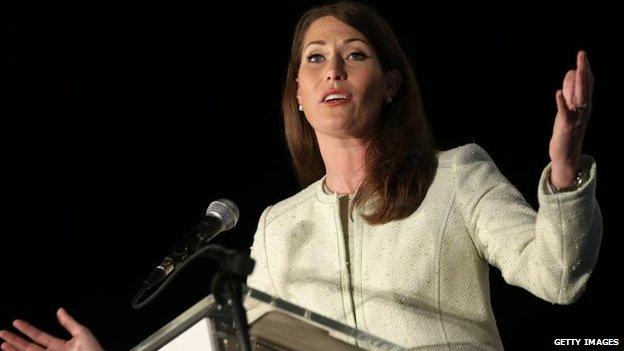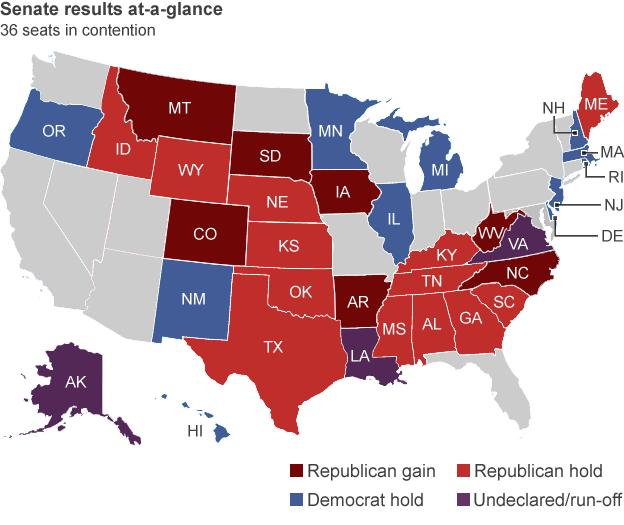US mid-terms: Republicans win control of the Senate
- Published
"We are heading to Washington, and we are going to make them squeal" - successful Iowa Republican Senator-elect Joni Ernst
The Republicans have won control of the Senate in the US mid-term elections, increasing their power in the final two years of Barack Obama's presidency.
The Republicans also increased their grip on the House of Representatives and now control both chambers of Congress for the first time since 2006.
Republican Senator Mitch McConnell said the result was a vote against "a government people can no longer trust".
Mr Obama is to hold a press conference later on Wednesday.
He has already invited congressional leaders from both parties to the White House for talks on Friday.
Mr Obama reportedly tried to call Mr McConnell as the results came in, but the two did not speak and the president left a message.
'Work together'
About one-third of the Senate, the entire House of Representatives, 36 of 50 state governors, and numerous state and local offices were up for election.
Throughout the campaign, Republicans focused on voter dissatisfaction with Mr Obama, a Democrat, describing the vote as a referendum on his presidency.
As the first results came in late on Tuesday, it became clear they had made the six gains they needed to win control of the Senate.
The Republicans won in Arkansas, Colorado, Iowa, Montana, North Carolina, South Dakota and West Virginia. The party now controls 52 seats, and is tipped to win at least one more as votes are counted in other states.

Republican Mitch McConnell is to become the Senate majority leader

Mr McConnell defeated the challenge of Alison Lundergan Grimes in Kentucky
The Republicans are also projected to increase their majority in the House of Representatives to levels not seen since before World War Two.
They also made gains among the 36 governorships up for re-election.

Analysis, Jon Sopel, BBC North America editor
Barack Obama's unpopularity in the run-up to these mid-term elections is hard to exaggerate. One of the things that is lost in the big picture of the night is some of the sidebar poll findings - the American people are fed up with all their politicians. It's not just the occupant of the White House, though as Harry Truman most famously noted, the buck stops with the president.
Mitch McConnell will be conscious of that, and will know that in two years' time, when it is not just the Senate but the presidency in play, the American people could be venting their spleen on him. Be fearful of the blame game.
That leaves the Kentucky senator with some important tactical decisions to make.

The Republicans will now have the power to complicate, if not block completely, Mr Obama's agenda in the last two years of his tenure in the White House.
Control of the Senate will also enable the Republicans to stymie his ability to name new federal judges, cabinet members and senior government officials.
In addition to seats the party won from the Democrats, the Republicans retained seats in at least a dozen other states.
Republicans in numbers
-
100 Women elected to Congress - including Mia Love - first black Republican female
-
1st African American, Tim Scott, elected in the South since 1870
-
3rd George Bush - grandson and nephew of two former presidents
-
18 Age of Saira Blair, the youngest elected state legislator
-
30 Age of Elise Stefanik, youngest woman elected to US Congress
In Louisiana, neither of the top two candidates gained 50% of the vote, forcing a run-off election in early December.
In Virginia, Democrat Mark Warner was expected to retain his Senate seat amid a much tighter than expected race with Republican ex-lobbyist Ed Gillespie.
In other developments:
Voters approved ballot measures legalising cannabis in Oregon and Washington DC, while Florida rejected a medical marijuana proposal
Three states - South Dakota, Arkansas and Nebraska - approved increases in the minimum wage and a fourth - Alaska - was poised to do so as well
Michael Grimm, under federal indictment for fraud, was re-elected to his House seat from New York City
Republican Scott Brown has now lost Senate races in two states - New Hampshire on Tuesday and Massachusetts in 2012
Utah's Mia Love has become the first black Republican woman to be elected to the House
One of the night's key early results came in Kentucky, where Mr McConnell, the Republican Senate minority leader, fended off Democrat Alison Lundergan Grimes.
Mr McConnell will now become the Senate majority leader, giving him control over the chamber's legislative agenda and floor proceedings.
Rajesh Mirchandani explains the mid-term election results and what they mean for the Obama presidency
He said in his victory speech: "I don't expect the president to wake up tomorrow and view the world any differently than he did when he woke up this morning. He knows I won't either.
"But we do have an obligation to work together on issues where we can agree."
Current Senate Majority Leader Harry Reid congratulated Mr McConnell in a short statement.
"The message from voters is clear - they want us to work together," said Mr Reid of Nevada, whose role in the soon-to-be Democratic minority remains uncertain. "I look forward to working with Senator McConnell to get things done for the middle class."

In the governor's races, Republican incumbents survived tough re-election battles in Florida, Maine and Wisconsin.
Political gridlock in Congress has already reached historic levels and was a major concern among voters, with many expressing their frustration with the lack of progress on the most pressing issues facing the nation.